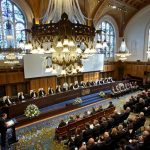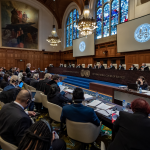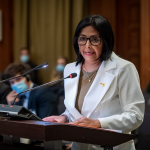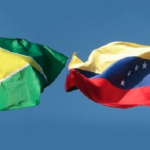
The International Court of Justice today rejected and dismissed Venezuela’s objections to Guyana’s case before the Court, paving the way for the substantive case to move forward.
The Court found that Venezuela’s application had no legal basis.
Venezuela wanted the Court not to entertain Guyana’s substantive application on several grounds, one of which is that Great Britain should be party to the case instead of Guyana.
But the ICJ did not agree with that contention and ruled that Venezuela negotiated with Guyana during the mixed commission and the good offices process and never requested the involvement of the United Kingdom.
The ICJ President, Judge Joan Donoghue said based on Venezuela’s track record, there was an indication by Venezuela that the matter could be settled without the input of the United Kingdom.
The Judge also said that both parties were in agreement that Great Britain had no role to play in the settlement of the controversy.
The ruling by the World Court now makes way for Guyana to present its substantive case before the court for a final judicial settlement.
“The Court concludes that by virtue of being a party to the Geneva agreement, the United Kingdom accepted that the dispute between Guyana and Venezuela could be settled by one of the means set out by the UN Charter. If the court on the judgment of its merits were called to pronounce on certain conduct attributed to the United Kingdom, which cannot be determined at present, this would not preclude the court from exercising its jurisdiction which is based on the application of the Geneva agreement. The Preliminary objections raised by Venezuela must therefore be rejected,” ICJ President Judge Joan Donoghue said.
The Court also found that the good offices process which was conducted by the Secretary General of the United Nation, was also never objected to by any party on the grounds that the United Kingdom is not part of those negotiations.
Venezuela had argued that the 1899 arbitral award is invalid. Guyana has repeatedly objected to that position.
Guyana described Venezuela’s objections to the case as a delaying tactic, so that its substantive case could be delayed.
Today’s hearing was attended by a battery of lawyers representing Guyana along with the Co-Agents in the matter, former Foreign Minister Carl Greenidge and Permanent Secretary in the Foreign Ministry, Ambassador Elizabeth Harper. Attorney General Anil Nandlall was also in attendance.











You must be logged in to post a comment Login